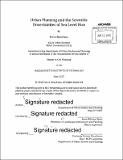Urban planning and the scientific uncertainties of sea level rise
Author(s)
Beaudreau, Pierre, M.C.P. Massachusetts Institute of Technology
DownloadFull printable version (16.13Mb)
Other Contributors
Massachusetts Institute of Technology. Department of Urban Studies and Planning.
Advisor
Anne Whiston Spirn.
Terms of use
Metadata
Show full item recordAbstract
While climate change has recently gained much needed traction in our societal and political spheres, the science behind climate change continues to be a complex interplay of countless variables, timelines, and scenarios. Despite climate scientists' best efforts to predict what the future holds in terms of climate change and sea level rise, various limitations and uncertainties inherent in climate models challenge our ability to plan appropriately for the future. As planners and designers adopt various sea level rise thresholds in their policies and designs, the uncertainties of the climate models, and climate itself, are often overlooked. Major planning and design projects and proposals, such as those resulting from the 'Rebuild by Design' competition launched by the United States federal government, were found to use different sea level rise thresholds in their approaches. Such observed variation in projects' sea level rise preparedness mirrored the uncertainty in the climate models themselves and led to using a more long-term analysis of the incremental impacts of sea level rise on the built environment. Using modeling and scripting software (Rhino and Grasshopper) a customizable tool named SEARISE 3D was developed to allow planners and designers to explore the impacts of sea level rise on any portion of any city (provided basic elevation and infrastructure data). Using data generated through the tool, decision-makers can find the optimal longterm sea level rise threshold to begin preparing for. Similarly, planners, designers, and architects can use the tool to visually explore flooding scenarios and create base layers for producing design proposals to respond to sea level rise. SEARISE 3D was made available online for free (under the MIT License) for all to use, improve, and develop further metrics for decision-making in face of our uncertain climate future.
Description
Thesis: M.C.P., Massachusetts Institute of Technology, Department of Urban Studies and Planning, 2015. Cataloged from PDF version of thesis. Includes bibliographical references (pages 82-83).
Date issued
2015Department
Massachusetts Institute of Technology. Department of Urban Studies and PlanningPublisher
Massachusetts Institute of Technology
Keywords
Urban Studies and Planning.